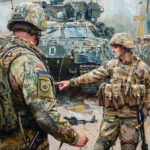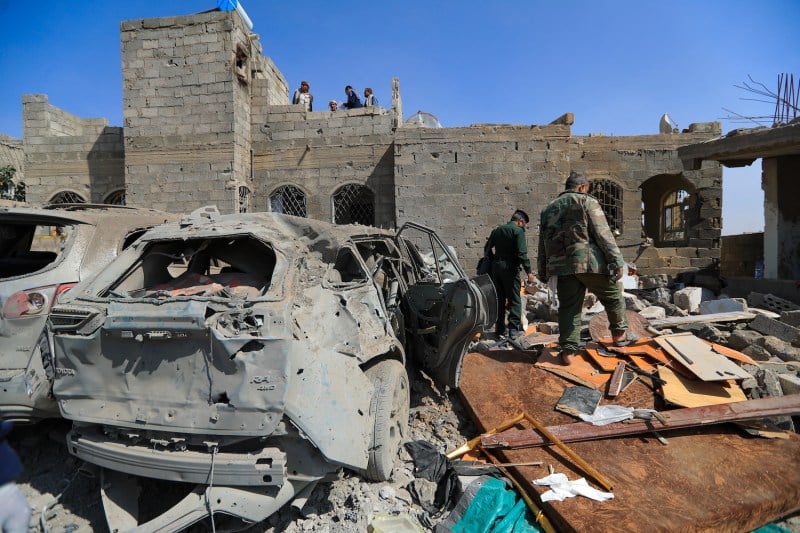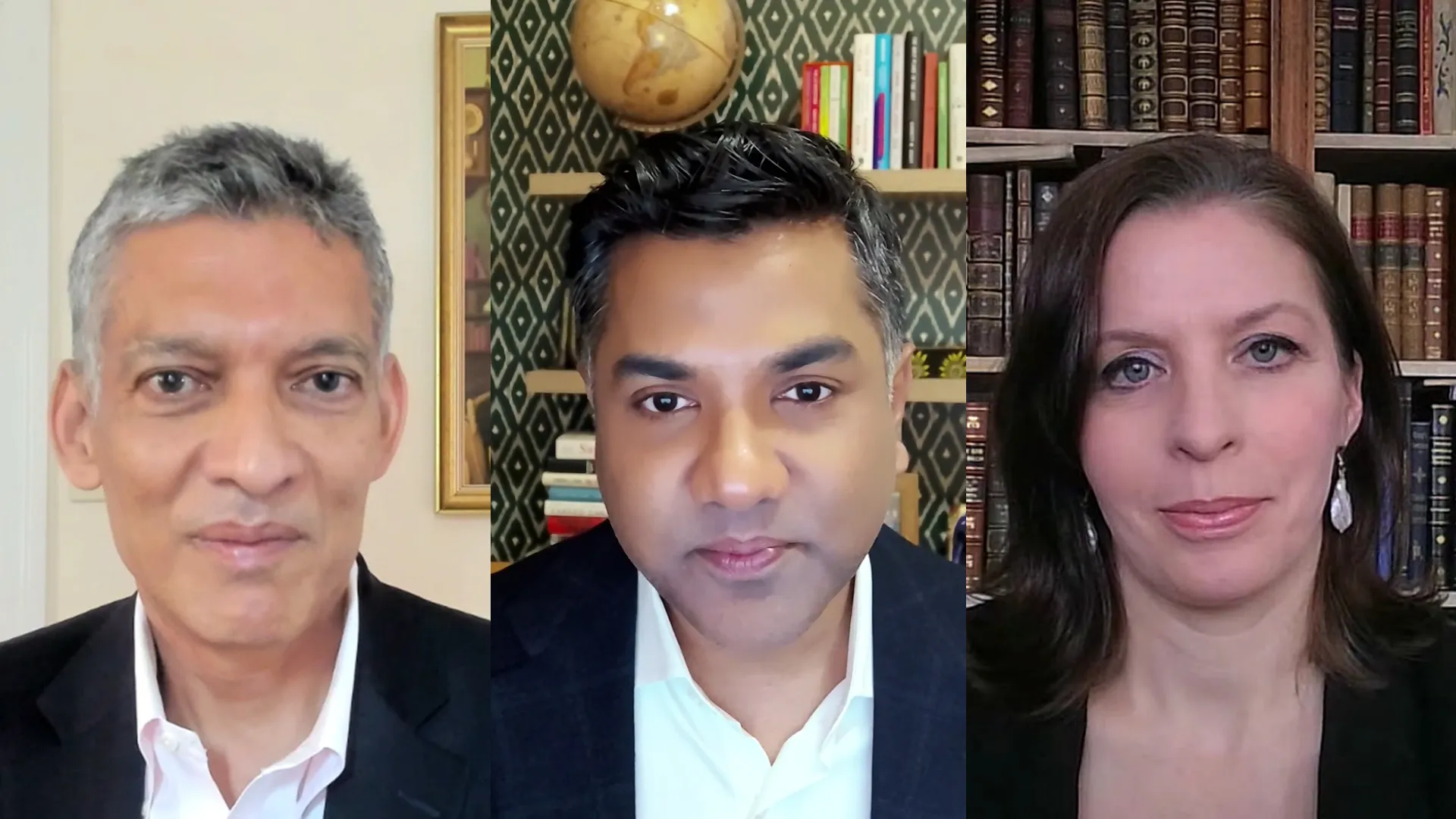European Leaders Convene Emergency Summit on Ukraine, Russia

European Leaders Convene Emergency Summit on Ukraine, Russia
The continent is seeking new ways to defend itself without relying on U.S. support.
Ukrainian President Volodymyr Zelensky shakes hands with European leaders ahead of an emergency summit to discuss continued support for Ukraine in Brussels on March 6. Ludovic Marin/AFP via Getty Images
Welcome back to World Brief, where we’re looking at an emergency EU summit on Ukraine and European security, U.S. President Donald Trump’s latest threat against Hamas, and an accidental bombing in South Korea.
Is Europe on Its Own?
With U.S. President Donald Trump suspending U.S. military aid to Ukraine and repeatedly telling Europe that it needs to take the lead on its own defense, European leaders convened an emergency summit in Brussels on Thursday to discuss how to support Ukraine and ensure the future of the continent’s security without relying on the United States.
Welcome back to World Brief, where we’re looking at an emergency EU summit on Ukraine and European security, U.S. President Donald Trump’s latest threat against Hamas, and an accidental bombing in South Korea.
Is Europe on Its Own?
With U.S. President Donald Trump suspending U.S. military aid to Ukraine and repeatedly telling Europe that it needs to take the lead on its own defense, European leaders convened an emergency summit in Brussels on Thursday to discuss how to support Ukraine and ensure the future of the continent’s security without relying on the United States.
On Thursday, Trump confirmed NBC News’ report that he is considering a major shift in U.S. NATO policy that would have Washington prioritize military engagement with, and even defense of, member countries that meet the alliance’s defense-spending threshold. “Well, I think it’s common sense, right? If they don’t pay, I’m not going to defend them,” he said.
Among the top agenda items at the EU meeting was defense spending. “Spend, spend, spend on defense and deterrence. That’s the most important message,” Danish Prime Minister Mette Frederiksen said. European Commission President Ursula von der Leyen stressed an $841 billion proposal that would allow countries to bolster their spending, and German politician Friedrich Merz pushed for loosening debt rules in Berlin.
The summit addressed Trump’s recent pause of U.S. military assistance and intelligence-sharing to Ukraine, which went into effect earlier this week. Keith Kellogg, Washington’s Russia-Ukraine envoy, likened Trump’s aid decision to “hitting a mule in the face with a two-by-four, you know. You got their attention.” Nearly all European leaders were quick to pledge their continued loyalty, with French Defense Minister Sébastien Lecornu vowing to keep providing military aid to Kyiv.
Paris also proposed using its nuclear arsenal as a deterrent to protect the continent from a potential Russian invasion. France is the only nuclear power in the European Union and one of just three nuclear powers in NATO, the other two begin the United States and the United Kingdom. “The future of Europe should not be decided in Washington or Moscow,” Macron said on Wednesday ahead of the summit.
But Paris’s campaign for European unity has faced pushback. Both Hungarian Prime Minister Viktor Orban and Slovak Prime Minister Robert Fico threatened to veto part of the summit’s statement on Kyiv if it did not call on Ukrainian President Volodymyr Zelensky to accept an immediate cease-fire, even if that entails major concessions. In the end, Orban refused to sign the joint statement on support for Ukraine, but the other 26 EU members—including Fico—went ahead without him. However, Orban joined his colleagues to endorse statements calling for bolstering the bloc’s collective defense.
Meanwhile, Russian attacks against Kyiv continued. A Russian missile hit a hotel in Zelensky’s hometown on Thursday, killing at least four people and injuring more than 30 others. U.S. citizens, as well as those from Ukraine and the United Kingdom, were staying in the hotel at the time. “There must be no pause in the pressure on Russia to stop this war and terror against life,” Zelensky said in a statement about the attack. That he explicitly noted that Americans were among those put at risk in the Russian strike seemed deliberate at a time when Trump has walked back on Washington’s commitments to Kyiv in favor of friendlier ties with Moscow.
Such a shift in U.S. policy has been seen across several theaters. Reuters reported on Thursday that the White House is planning to revoke the temporary legal status of around 240,000 Ukrainians who fled the war, potentially making them vulnerable to deportation. The move is expected as soon as April, but White House press secretary Karoline Leavitt posted on X that “no decision has been made at this time.”
Senior Trump allies have also held talks with Ukrainian opposition leader Yulia Tymoshenko as well as members of former Ukrainian President Petro Poroshenko’s party to discuss the possibility of fast-tracking Ukrainian elections, according to Politico and subsequently confirmed by Tymoshenko and Poroshenko. Trump has accused Zelensky of being a “dictator” for delaying elections, but Ukraine’s constitution dictates that a vote can be suspended while the country is under martial law. However, Tymoshenko and Poroshenko both said on Thursday that they oppose holding elections before the fighting has ended.
U.S. Secretary of State Marco Rubio, U.S. special envoy to the Middle East Steve Witkoff, and U.S. National Security Advisor Mike Waltz will head to Riyadh, Saudi Arabia, next Wednesday to meet with a Ukrainian delegation—one day after Zelensky will travel there on a state visit. Meanwhile, European leaders will hold another summit on Ukraine from March 20-21.
Today’s Most Read
- How Trump Is Killing the U.S. Defense Industry by Elisabeth Braw
- Trump Is Trying to Remake the United Nations by Richard Gowan
- What Europe Can Do If Trump Drops Russia Sanctions by Agathe Demarais
What We’re Following
“Hell to pay.” Trump issued an ultimatum to Hamas on Wednesday, demanding in a post on Truth Social that the militant group “[r]elease all of the Hostages now, not later, and immediately return all of the dead bodies of the people you murdered, or it is OVER for you.” Trump vowed to send Israel “everything it needs to finish the job” and stressed that failure to do as he says means “THERE WILL BE HELL TO PAY,” echoing a similar threat that he issued before taking office.
Trump’s warning followed a rare meeting between senior U.S. diplomats and Hamas officials in Qatar on Wednesday, which discussed the release of five Israeli American hostages still in Gaza, one of whom is believed to be alive. Such direct talks broke a long-standing U.S. policy of refusing to negotiate with groups designated as terrorists; Hamas was deemed a terrorist group in 1997.
On Thursday, Hamas brushed off Trump’s latest threat, accusing the U.S. president and Israel of trying to back out of phase two of the cease-fire deal. Hamas spokesperson Abdel Latif al-Qanoua said that the “best path to free the remaining Israeli hostages” is through negotiations for phase two, which were supposed to begin last month but have been delayed by Israel.
Wrong coordinates. Two South Korean KF-16 fighter jets accidentally dropped eight MK-82 bombs on a civilian area on Thursday, injuring at least 15 people, two of whom are in serious condition. The explosives fell outside of a designated firing range during joint live-fire exercises with the U.S. military in the city of Pocheon, near the North Korean border.
“We are sorry for the damage caused by the abnormal drop accident, and we wish the injured a speedy recovery,” the South Korean Air Force said in a statement. According to an Air Force official, one of the pilots entered the wrong coordinates for the bombing site, but investigators are uncertain as to why the second jet also dropped its bombs.
Later that day, Seoul suspended all live-fire drills in the country and ordered an investigation into the incident. It is unclear how long the suspension might last, but local authorities said it would not affect annual U.S.-South Korean large-scale military exercises scheduled to begin next Monday.
You’re fired. New Zealand recalled its top diplomat in the United Kingdom this week over public comments he made that were critical of Trump, officials announced on Thursday.
During an event in London on Tuesday, Kiwi High Commissioner to the U.K. Phil Goff answered a question about the U.S. president’s role in Europe with a sarcastic comment: “President Trump has restored the bust of [former British Prime Minister Winston] Churchill to the Oval Office, but do you think he really understands history?” Goff asked, alluding to parallels between Churchill’s criticism of his predecessor for making a deal with Nazi leader Adolf Hitler and Trump’s eagerness to broker a deal with Russian President Vladimir Putin on Ukraine.
New Zealand’s foreign minister, Winston Peters, called Goff’s remarks “deeply disappointing” and said they made his position “untenable,” as they were personal opinion and not representative of Wellington. “If he had made that comment about Germany, France, Tonga, or Samoa, I’d have been forced to take this action,” Peters said. But former Prime Minister Helen Clark wrote on X that it was “a very thin excuse.”
Odds and Ends
Denmark’s state-run postal service, PostNord, announced on Thursday that it will be ending all letter deliveries by the end of this year. With letter volumes declining 90 percent since the start of this century, the agency has decided to cut 1,500 jobs, remove 1,500 red postboxes, and prioritize digitalization. But don’t worry, Transport Minister Thomas Danielsen said. The government “can still send and receive letters everywhere in the country” despite the changes.
Alexandra Sharp is the World Brief writer at Foreign Policy. X: @AlexandraSSharp
More from Foreign Policy
-

Samuel Huntington holds his hand to his chin while sitting in an office. Samuel Huntington Is Getting His Revenge
The idea of a global “clash of civilizations” wasn’t wrong—it was just premature.
-

U.S. President Donald Trump meets with Ukrainian President Volodymyr Zelensky at the White House on Feb. 28. The Perils of a Reality TV Presidency
The Trump-Zelensky shouting match is a reminder that international diplomacy was never meant to be carried out in front of billions of eyes.
-

A Ukrainian serviceman trains in the woods near the frontline in Ukraine. Three Years On, What’s Next for Europe and Ukraine?
Nine thinkers on the bombshells coming out of Washington.
-

Donald Trump is seen inside a helicopter at night looking down at a cell phone Trump’s New Map
America’s first post-literate president has only geography to fall back on.








Join the Conversation
Commenting on this and other recent articles is just one benefit of a Foreign Policy subscription.
Already a subscriber?
.
Subscribe
Subscribe
View Comments
Join the Conversation
Join the conversation on this and other recent Foreign Policy articles when you subscribe now.
Subscribe
Subscribe
Not your account?
View Comments
Join the Conversation
Please follow our comment guidelines, stay on topic, and be civil, courteous, and respectful of others’ beliefs.
Change your username |
Log out
Change your username:
CANCEL
Confirm your username to get started.
The default username below has been generated using the first name and last initial on your FP subscriber account. Usernames may be updated at any time and must not contain inappropriate or offensive language.